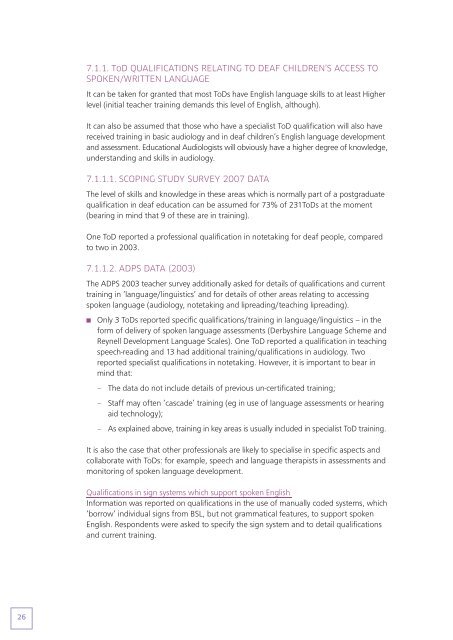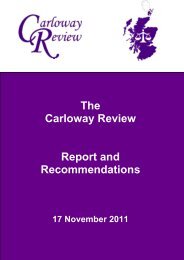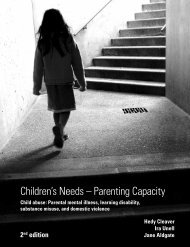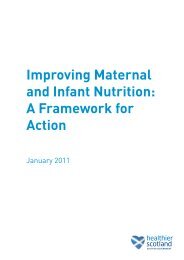British Sign Language and Linguistic Access Working Group ...
British Sign Language and Linguistic Access Working Group ...
British Sign Language and Linguistic Access Working Group ...
You also want an ePaper? Increase the reach of your titles
YUMPU automatically turns print PDFs into web optimized ePapers that Google loves.
7.1.1. ToD QUALIFICATIONS RELATING TO DEAF CHILDREN’S ACCESS TOSPOKEN/WRITTEN LANGUAGEIt can be taken for granted that most ToDs have English language skills to at least Higherlevel (initial teacher training dem<strong>and</strong>s this level of English, although).It can also be assumed that those who have a specialist ToD qualification will also havereceived training in basic audiology <strong>and</strong> in deaf children’s English language development<strong>and</strong> assessment. Educational Audiologists will obviously have a higher degree of knowledge,underst<strong>and</strong>ing <strong>and</strong> skills in audiology.7.1.1.1. SCOPING STUDY SURVEY 2007 DATAThe level of skills <strong>and</strong> knowledge in these areas which is normally part of a postgraduatequalification in deaf education can be assumed for 73% of 231ToDs at the moment(bearing in mind that 9 of these are in training).One ToD reported a professional qualification in notetaking for deaf people, comparedto two in 2003.7.1.1.2. ADPS DATA (2003)The ADPS 2003 teacher survey additionally asked for details of qualifications <strong>and</strong> currenttraining in ‘language/linguistics’ <strong>and</strong> for details of other areas relating to accessingspoken language (audiology, notetaking <strong>and</strong> lipreading/teaching lipreading).■Only 3 ToDs reported specific qualifications/training in language/linguistics – in theform of delivery of spoken language assessments (Derbyshire <strong>Language</strong> Scheme <strong>and</strong>Reynell Development <strong>Language</strong> Scales). One ToD reported a qualification in teachingspeech-reading <strong>and</strong> 13 had additional training/qualifications in audiology. Tworeported specialist qualifications in notetaking. However, it is important to bear inmind that:– The data do not include details of previous un-certificated training;– Staff may often ‘cascade’ training (eg in use of language assessments or hearingaid technology);– As explained above, training in key areas is usually included in specialist ToD training.It is also the case that other professionals are likely to specialise in specific aspects <strong>and</strong>collaborate with ToDs: for example, speech <strong>and</strong> language therapists in assessments <strong>and</strong>monitoring of spoken language development.Qualifications in sign systems which support spoken EnglishInformation was reported on qualifications in the use of manually coded systems, which‘borrow’ individual signs from BSL, but not grammatical features, to support spokenEnglish. Respondents were asked to specify the sign system <strong>and</strong> to detail qualifications<strong>and</strong> current training.26
















